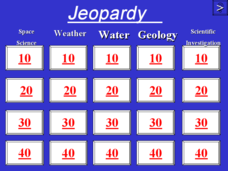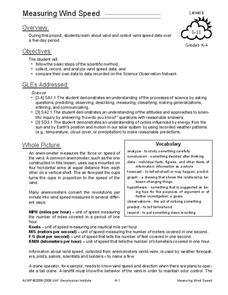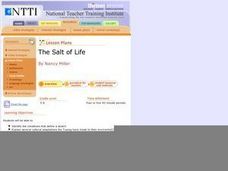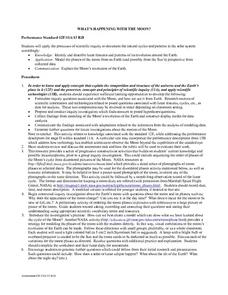NASA
Einstein and His Times
Scholars research and present on the historical happenings of 1919. After sharing their findings, pupils debate about how Congress dealt with the moral issues of the time. The evaluation asks learners to write a persuasive essay...
Teach Engineering
Basically Acids
Base your lesson plan on acids and bases on an informative resource. The first installment of a five-part module on the science behind Harry Potter has individuals investigate acid/base chemistry with the use of invisible inks. They also...
Curated OER
Jeopardy - Earth Sciences
Questions about water, weather, geology, astronomy, and the scientific process make up this Jeopardy game. It is a pretty well-rounded set of slides, although you may want to be aware that a few of the questions are specific to the state...
Curated OER
Measuring Wind Speed
Young scholars study wind speed and collect wind speed data. In this wind speed lesson, students visit a website to learn about the local wind speed forecast for their week. Young scholars discuss wind and wind speed. Students collect...
Curated OER
Unit 12: Enlightenment and French Revolution
For this Enlightenment lesson, students respond to 34 short answer questions about John Locke, Thomas Hobbes, Baron de Montesquieu, Jean Jacques Rousseau, Voltaire, Denis Diderot, and Mary Wollstonecraft.
Curated OER
Science: Fossil of a Carbonized Plant
Learners classify leaves by shape and margins and use them to create models of plant fossils. By using paper over a leaf, they simulate fossilization of organisms onto sedimentary rocks. Following instructions on worksheets, students...
Curated OER
The Salt of Life
Students identify and describe significant historical periods and patterns of change within and across cultures, such as the development of ancient cultures and civilizations, the rise of nation states, and social, economic, and...
Curated OER
Earth's Warming Climate: Are We Responsible
Students examine the atmospheric data for CO2. In this web-based atmospheric lesson, student follow instructions to examine and plot on-line scientific data about the CO2 levels in our atmosphere and analyze the changes found in the data.
Curated OER
Early Humans
Sixth graders read about the different types of Humanoid. They examine the different cultural beliefs and their own personal beliefs about evolution. They research the species using the scientific theory about evolution.
S2tem Centers SC
Seasons
Winter, spring, summer, and fall—take the learning of the seasons beyond the elementary level to the middle school classroom. Curious learners begin by watching videos about the seasons and the rotation of planet Earth. Then, they...
Curated OER
Creating Context: The Printing Press as Impetus
Tenth graders examine the invention of the Gutenberg printing press and its effect on society. In groups, they research how much the press enabled various revolutions around the globe. They also identify the causes and effects of each...
Curated OER
Inventors and Scientists
Learners research a scientific breakthrough. In this science lesson, students write an essay on a technology that has changed the world.
Curated OER
Lesson Plan on the Division of Labor
Fifth graders explain how workers performing specific tasks contributes to the total production output of the workers.
Curated OER
Chinese Inventions A Selected History of Science and Invention in China
Students study the history of Chinese technology by identifying when and where items were invented or discovered.
Curated OER
What's Happening With the Moon?
Young scholars review the process of scientific inquiry. Using this information, they identify the patterns and cycles of the moon as it revolves around the Earth. In groups, they model the phases of the moon from the Earth and Sun's...
Curated OER
Sun Shadow Cycles
High schoolers use diagrams to review how the Earth rotates around the sun. In groups, they use the same diagrams to explain how the sun shadows are produced and how they differ between seasons. They describe the Earth's rotation and...
Curated OER
Charting Seasonal Changes
Students research the Earth's patterns of rotation and revolution, create a chart and graph of these patterns and use them to explain the causes of night and day and summer and winter.
Curated OER
One Room School House Reading Lesson
Students explore schools during the Colonial period. In this American history lesson plan, students participate in a simulation of school days in Colonial America. Students visit a museum and use the schoolhouse as a setting for their...
Curated OER
What was Newton's Idea of Science?
Students form logical foundations for analysis of observations. They improve analytic reading abilities through practice. Students investigate the foundations of scientific thought processes and how to apply them.
Curated OER
Who Invented It? When? Chinese Inventions: An Introductory Activity
Students use Robert Temple's "The Genius of Chins: 3,000 Years of Science, Discovery and Invention", to understand how much the Chinese have contributed with their scientific and technological ability.
Curated OER
Exploring the Celestial Neighborhood
Ninth graders study the origin and organization of the solar system. They investigate the Earth's place in the system and how planetary motions explain natural phenomena observable from Earth.
Curated OER
Mariposas
Students examine how animals use camouflage for survival. In this investigative lesson students define vocabulary words and see how it is the environment that controls which adaptations will help in survival.
Curated OER
Galileo and the Inevitability of Ideas
Students research Galileo's work and contributions to science. They make a timeline of Galileo's life, discuss the historical context for his book "Dialogue on the Two Chief World Systems" and examine his trial by the Inquisition for...
Curated OER
Sentence Completion: High-Intermediate Level
Learners can practice their reading strategies and comprehension skills with a sentence completion worksheet that comes with a detailed answer key. Whether you use the worksheet as an assessment or as a group or individual practice...

























